Is coffee the ultimate answer to extreme poverty in Burundi?
Follow the caf é (Wechat official account vdailycom) and found that Beautiful Cafe opened a small shop of its own.
The challenge of coffee production
Coffee as a crop was introduced into the colony of Burundi in the 1930s. Since then, the question of whether coffee cultivation should be publicly owned or privately recognized by the government has been wavering. Decades of civil war has seriously hindered the development of coffee cultivation and the realization of its output value.
There are other factors that are bad for the coffee industry: bureaucracy is one, geography is the second. As a landlocked country, Rwanda to the north, Tanzania to the east and south, and the Democratic Republic of the Congo to the west, it is difficult to export coffee because it is difficult to maintain the quality of coffee in transit.
Another most damaging factor is potato defects (Potato Defect), which give beans the taste of raw potatoes. Potato defects are raw bean defects caused by stink bugs, which drill holes into the surface of coffee cherries and deep into the pulp, and the effect is obvious: one infected bean is enough to destroy a whole sack of products. So buyers are also reluctant to get their hands on Burundian coffee.
It is not easy to distract attention from Burundi's internal conflict and severe poverty, while founders of the Long Miles Coffee Initiative, such as Ben and Kristy Carlson, argue that the mere sight of drawbacks ignores its rich natural conditions, because Burundi not only has fertile soil but also has a unique microclimate.

Long Miles Coffee Project: the Hope of Coffee growers
Long Miles is actually a coffee maker transformed from a small American family. The project began with a dream of awakening growers' awareness of production through high-quality coffee, thus directly and really promoting the relationship between bakers and growers. However, the Carlson soon realized that the only way they could achieve their vision and ensure that growers were fairly paid was to set up a washing plant.
Why is it a washing factory? Previously, growers had to walk nine miles across the mountains to get to the washing plant-almost once a day. However, when they arrive at the washing plant, the coffee fruit is usually too fermented to be put into production. With the help of friends and blog readers, Long Miles built its first washing plant, providing convenient raw bean handling for nearly 2500 coffee growers. After the completion of the washing plant, the harvest in the first season was sold out even before the raw beans were dried, so there was a second washing plant.
Founder Kristy Carlson gave us a brief account of the Long Miles Coffee Plan:
Can you tell me what high quality and low quality products there are?
Of course, high-quality products come from the communities near where our washing plant is located, namely Kayanza and Bukeye. The life of the farmers we work with has undergone significant and positive changes, which can not be exchanged for money. We are happy to run avant-garde programs and test different theories to improve coffee quality, and teaching farmers planting skills is one of the key points. At Bukeye, our agronomist Epaphras often uses a sugar meter to show farmers different coffee cherries at the bean picking table.
Burundi is one of the most difficult countries to do business with, so it must have something of low quality. The export of raw beans requires signatures from 29 departments and numerous licensing documents, and it is extremely difficult to complete these administrative tasks. You also have to deal with some emergencies-from theft to equipment failure.
How to beat potato defects?
We have started a program with District Roaster called Coffee Scouts, where we hire local young people and train them to find potato bugs and train them in agriculture and data recording skills. When Coffee Scout finds the bugs, they use pyrethrum, a cheap and natural insecticide, to target the bugs. Soon, the bugs will fall from the coffee trees, and then they will collect them for future research. At present, agronomist Epaphras has led a team of 14 "boy scouts", each of whom will assign 30 farmers who visit regularly, and they will personally take responsibility for training and improving planting practices, from bug catching, mulching, construction to fertilization.
People are usually interested in the story behind the coffee mug. Can you tell the story of a farmer as an example?
The story of ESP é ciose in my blog. The impact of the war still has a lasting impact on the land and its people. For Esp é ciose, she is the sole provider of six children; her husband died in the civil war that ended in 2006, and she can only make a living by growing coffee; Esp é ciose's farm grows a variety of crops to meet the needs of the family. It's a 45-minute walk from the farm to Long Miles's washing plant in Bukeye, where she and her children take ripe coffee cherry fruit on their heads. She grows hard and has never tasted coffee, because coffee is still a luxury they can't afford.
Esp é ciose's story may be a little desperate for you, but it's much more than that-it's a story about dependence and survival, and she found her way to survive in this land, and many people might say it's an extravagant hope to survive here. ESP é ciose is a community leader, a mother and a farmer who has so many labels that are not limited to widows and poverty. The challenges she faces are obvious, as is the encouragement and resistance she brings.
Important Notice :
前街咖啡 FrontStreet Coffee has moved to new addredd:
FrontStreet Coffee Address: 315,Donghua East Road,GuangZhou
Tel:020 38364473
- Prev

There are striking similarities between Burundian coffee and Rwandan coffee.
Follow the caf é (Wechat official account vdailycom) found that the beautiful cafe opened a small shop of its own, formerly known as Uruidi, formed a feudal kingdom in the 16th century, began to be invaded by Britain, Germany and Belgium in the middle of the 19th century, and then fell under the control of the Belgian army in 1916. After World War I, the merged Rwanda-Wulong of the League of Nations bar was assigned to Belgium, and
- Next

Burundi coffee detailed explanation and future development
Pay close attention to the coffee comment (Weixin Official Accounts vdailycom ) and find that the beautiful coffee shop opens its own small shop. Burundi coffee summary: coffee varieties and varieties: 96% Arabica varieties, most of which are Jackson Bourbon and Mibirisi. Flavor spectrum: mellow, sour and bright, moderate sweetness. Main appellations: Bukfactor, Kilmiro, Namilwa. Altitude: 1000-200
Related
- Detailed explanation of Jadeite planting Land in Panamanian Jadeite Manor introduction to the grading system of Jadeite competitive bidding, Red bid, Green bid and Rose Summer
- Story of Coffee planting in Brenka region of Costa Rica Stonehenge Manor anaerobic heavy honey treatment of flavor mouth
- What's on the barrel of Blue Mountain Coffee beans?
- Can American coffee also pull flowers? How to use hot American style to pull out a good-looking pattern?
- Can you make a cold extract with coffee beans? What is the right proportion for cold-extracted coffee formula?
- Indonesian PWN Gold Mandrine Coffee Origin Features Flavor How to Chong? Mandolin coffee is American.
- A brief introduction to the flavor characteristics of Brazilian yellow bourbon coffee beans
- What is the effect of different water quality on the flavor of cold-extracted coffee? What kind of water is best for brewing coffee?
- Why do you think of Rose Summer whenever you mention Panamanian coffee?
- Introduction to the characteristics of authentic blue mountain coffee bean producing areas? What is the CIB Coffee Authority in Jamaica?

